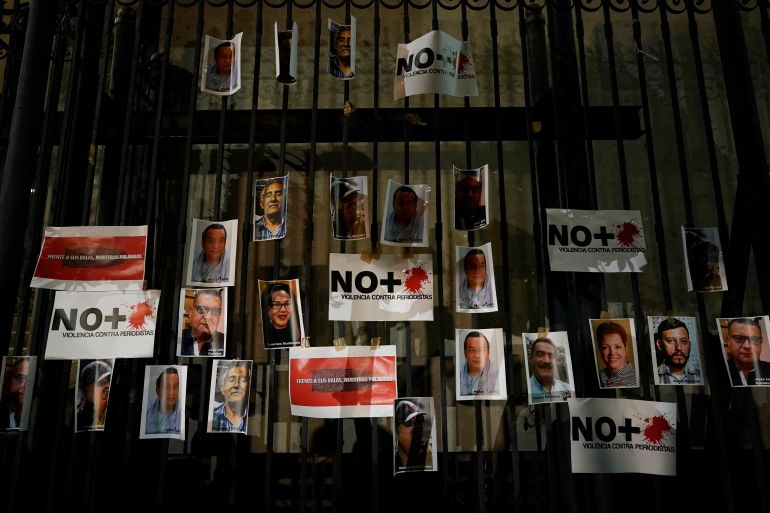Another journalist shot dead in Mexico, eighth so far this year
Armando Linares, director of Monitor Michoacan, the latest to be murdered in a spate of killings that has stirred international concern.

A journalist has been shot dead in western Mexico, becoming the eighth killed so far this year in an unprecedented spate of killings that has raised fears about the safety of journalists in the country.
Armando Linares, director of Monitor Michoacan, was shot dead at a house in the city of Zitacuaro in the state of Michoacan, the state attorney general’s office said on Tuesday.
Keep reading
list of 3 itemsAnother journalist attacked in Mexico; 3 killed this month
What’s behind the spike in journalist murders in Mexico?
Linares’ killing came six weeks after the slaying of a colleague, Roberto Toledo, from the same outlet Monitor Michoacan. It was Linares who announced Toledo’s death on January 31 in a video posted to social media.
Michoacan has long been convulsed by turf wars between powerful gangs battling for control of the market for illicit drugs.
There was no immediate information on a possible motive in the killing.
At the time of Toledo’s death, Linares told The Associated Press he had received several death threats after enrolling in a government journalist protection programme.
Asked who he thought was behind the threats, Linares said “they pass themselves off as an armed group, they pass themselves off as a criminal gang. We can’t verify whether it is true or not that they are this armed gang.”
Criminals in Mexico often claim they are part of a drug cartel to instil fear in their victims, whether or not they really are.
“We have organised crime, just like in the rest of the country, and Monitor worked on a lot of issues like illegal logging, given that we are near the monarch reserve,” Linares said in early February. “We wrote a lot about illegal logging and also a lot of issues like corruption in the municipal government.”
Drug cartels
Drug cartels in Mexico often make money by protecting illegal logging or extorting protection payments from avocado growers.
“The nightmare continues for the press in Mexico,” the press group Reporters Without Borders wrote in its social media accounts.
Mexican President Andres Manuel Lopez Obrador has reacted angrily to worldwide criticism of the killings.
In February, Lopez Obrador said US Secretary of State Antony Blinken was misinformed, after Blinken wrote “I join those calling for greater accountability and protections for Mexican journalists.”
Lopez Obrador claims the government is investigating all of the killings and suggested Blinken received bad information from other US agencies, mentioning the CIA, FBI and Drug Enforcement Administration.
“They’re tricking him,” he said. “We don’t tolerate the impunity of anyone.”
And last week, Lopez Obrador issued an irate response to European Parliament criticism of the journalist killings, accusing the Europeans of having a “colonialist mentality.”
The Mexican president also criticised European Union support for Ukraine, and called European Parliament members “sheep”.
“It is unfortunate that you vote like sheep to join the reactionary and coup-mongering strategy of the corrupt group opposed to the Fourth Transformation,” as Lopez Obrador calls his administration, he wrote in an open letter to the parliament.
Press freedom
The EU Parliament approved a resolution last Thursday urging Lopez Obrador to stop his harsh verbal attacks on reporters who criticise him, and ensure their safety.
Press groups say Lopez Obrador’s daily criticisms of journalists, whom he calls “conservatives” and “mercenaries,” make them more vulnerable to violence.
In February, the Inter American Press Association called on the president to “immediately suspend the aggressions and insults, because such attacks from the top of power encourage violence against the press”.
The EU resolution “calls on the authorities, and in particular the highest ones, to refrain from issuing any communication which could stigmatise human rights defenders, journalists and media workers, exacerbate the atmosphere against them or distort their lines of investigation”.
Journalists are often the targets of Mexico’s drug cartels, which seek to intimidate and manipulate coverage of their activities and their rivals.
Local politicians and government officials are also frequently linked to murders, according to the government, which has acknowledged that impunity in those killings runs above 90 percent.
In early March, gunmen killed Juan Carlos Muniz, who covered crime for the online news site Testigo Minero in the state of Zacatecas.
Jorge Camero, the director of an online news site who was until recently a municipal worker in the northern state of Sonora, was killed in late February.
In early February, Heber Lopez, director of the online news site Noticias Web, was shot to death in the southern state of Oaxaca.
Reporter Lourdes Maldonado Lopez was found shot to death inside her car in Tijuana on January 23. Crime photographer Margarito Martinez was gunned down outside his Tijuana home on January 17. Reporter Jose Luis Gamboa was killed in the Gulf coast state of Veracruz on January 10.